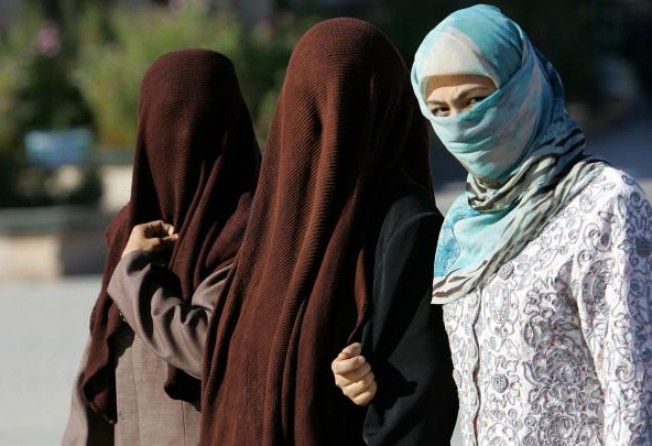There is no ban on Uygur dress, police deputy says at congress
Xinjiang policeman explains Muslim practices discouraged, not banned

Muslim head coverings and long beards are "kind of passé", a deputy police chief from Xinjiang's Kashgar prefecture said this week when explaining why authorities discouraged such practices among Uygurs, who make up 40 per cent of the region's population.
But Kurex Kanjir, a Uygur who is also a member of the Xinjiang delegation to the Communist Party's 18th national congress, said there was "absolutely no ban" on Uygurs wearing traditional Islamic dress.
Some Uygurs and human rights groups have blamed policies enacted by the region's Han-dominated government - which they say suppresses religious freedom - for sparking riots in the autonomous region.
Residents of the southern Xinjiang city of Hotan said a policy of discouraging women from wearing traditional black Islamic robes was one of the main triggers for a deadly attack on a police station in July last year that resulted in the deaths of at least 18 people.
"We have never said people cannot wear traditional ethnic dress," Kurex Kanjir said on the sidelines of the congress on Sunday. "But we are now in a civilised society and we hope to use modern culture to guide a somehow backward culture. It is something not to be forced, but something to be achieved through guidance."
His remarks follow a row triggered last year by a notice issued by a local government in Xinjiang that asked Uygurs, who are mostly Muslim, not to wear Arab dress, grow beards or cover their faces with veils.
The controversial notice was issued by the authorities in Yining's Dunmaili district in December in a bid to "dilute religious consciousness", a euphemism for the simmering ethnic tensions in restive southern Xinjiang. Nearly half of the city's population is Uygur.
The notice, first posted on the district's official website, was deleted following media reports. A spokeswoman for the Xinjiang Uygur autonomous region said at that time that she was not aware of the policy.
Government-linked experts said wearing veils, black robes and even growing beards were not part of the religious or cultural traditions of southern Xinjiang and had only become a local phenomenon recently.
Pan Zhiping, a specialist in Central Asian affairs at the Xinjiang Academy of Social Sciences, said the number of Uygurs wearing veils, black robes and sporting long beards had grown following ethnic clashes that swept Kashgar and the regional capital, Urumqi, in 2009, claiming 197 lives and injuring 2,000.
But some Uygurs in southern Xinjiang disagreed, saying such forms of dress had a long history in the area and were widely respected.
Pan said: "This is a very delicate issue and there is no law telling people what to wear or how to dress in the country. While it is plausible for the authorities to suspect there may have been some hidden forces inside and outside Xinjiang plotting against the government, it is of utmost importance for them to distinguish ordinary people from those potential trouble-makers."
Jiang Zhaoyong, a Beijing-based expert on ethnic issues, said the authorities should exercise caution to avoid fanning religious tensions among the Uygurs or being seen as cracking down on them simply because of their ethnicity or religious beliefs.
Kurex Kanjir said he was confident that, with Beijing's support, local authorities could maintain peace and security in Kashgar.
"I can say it is in the best situation in history and even better than many other major cities," he said, crediting Beijing's massive investment in Xinjiang to boost the region's economy following the 2009 riots.
"Only a few people carry out antisocial and anti-human activities … and they are hated by all peoples in Xinjiang. And to be honest, we are fully able to bring them under control."
Additional reporting by Shi Jiangtao